|
|
|
Sort Order |
|
|
|
Items / Page
|
|
|
|
|
|
|
| Srl | Item |
| 1 |
ID:
168024


|
|
|
|
|
| Summary/Abstract |
The sheer violence and magnitude of the repression that took place on and after 4 June 1989 shook Hong Kong society to the core as the crackdown forcefully questioned confidence in Hong Kong’s political future with the threshold of the handover looming on the horizon. In May and June 1989, the hundreds of thousands of Hong Kong citizens who took repeatedly to the streets to demonstrate against repression of the student movement did so out of feelings of anger, devastation, and anxiety about the political future of Hong Kong, as Joseph Y. Cheng wrote in a 2009 special issue of our journal devoted to June 4th on the 20th anniversary of the brutal suppression of the movement (Cheng 2009: 92). Since 1997, while the Special Administrative Region operates within the “one country two systems” (yiguo liangzhi 一國兩制) framework, June 4th continues to stand as a cornerstone in the definition of Hong Kong’s identity formation and its complicated relationship vis-à-vis China and the leadership of the Chinese Communist Party (CCP).
Over the last three decades, Hong Kong has been the site of the largest and probably most diverse forms of collective commemoration of the 4 June 1989 massacre. The ebbs and flows of these commemorations have articulated in complex ways with Hong Kong society, politics, and identity.
|
|
|
|
|
|
|
|
|
|
|
|
|
|
|
|
| 2 |
ID:
168017
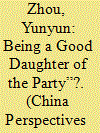

|
|
|
|
|
| Summary/Abstract |
Like other socialist institutions surviving in China’s market reforms, the All-China Women’s Federation (ACWF or WF when referring to its local branches), as the only state-sponsored organisation representing women’s interests, has been constantly refashioning itself to meet new existential challenges. In July 2015, the central leadership of the Chinese Communist Party commanded a new wave of mass organisational reforms, in which the Women’s Federation’s alienation from the grassroots and a weakening representation of women’s interests were questioned. After three years of intensive reform, are the local structures of the ACWF being substantially improved to reconnect to its mass base? Drawing from extensive fieldwork in three provinces and a neo-institutional analysis, this article argues that in the short term, although the reform serves principally as a consolidation of Party authority, local Women’s Federations are creatively using the reform to expand their popular base and broaden their representativeness. In the long term, however, local WFs are facing unreformed institutional problems such as political marginalisation, bureaucratisation, and ineffective implementation, which stagnate further development of China’s state feminism.
|
|
|
|
|
|
|
|
|
|
|
|
|
|
|
|
| 3 |
ID:
168023
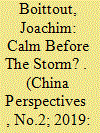

|
|
|
|
|
| Summary/Abstract |
This article revisits intellectual and literary trends in the few years preceding the launch of the New Culture Movement. Focusing on translations of texts dating from 1912 to 1915, this study explores how a group of writers usually considered conservative ventured to question the reliance of the individual on political structures that underpinned the then prevailing intellectual framework. I argue that these texts competed through literary means and preceded the claim of self-awareness forcibly voiced by New Culture activists in 1915 by achieving what I call a turn to the intimate. Reassessing the necessity to translate these texts as we celebrate this year the centenary of May Fourth Movement, this approach seeks to resurrect the long-forgotten but thriving literary and intellectual context from which the New Culture Movement’s ideas sprouted.
|
|
|
|
|
|
|
|
|
|
|
|
|
|
|
|
| 4 |
ID:
168016


|
|
|
|
|
| Summary/Abstract |
The Chinese People’s Political Consultative Conference (CPPCC) system is a curious institution: often ridiculed as a decorative “flower vase” for the one-Party regime, or, at best, a networking club meant to appease elite groups, it does not attract much scholarly attention. The Communist Party leadership, however, clings adamantly to what it says is a “broadly representative” intermediary body helping with policy reform and United Front work. In this article, we investigate the validity of this original logic with the help of fresh empirical data. We look at the CPPCC’s institutional history, principles of member selection, delegates’ self-conceptualisation, and their modes of operation. Intermediation, it appears, has always been a blurry task for CPPCC members, resulting in a wide array of behavioural choices – from parroting of the Party line to attempts at proactive agenda setting. After more than two decades of relative openness to innovative bottom-up policy proposals, new rules of unified conduct now again stifle the consultative potential of the CPPCCs – but there seems to be some room for intermediary agency left, especially at the local level.
|
|
|
|
|
|
|
|
|
|
|
|
|
|
|
|
| 5 |
ID:
168021


|
|
|
|
|
| Summary/Abstract |
This article examines intermediary governance space in China’s urban neighbourhood governance. It identifies new local governance mechanisms and state-society relations through which urban and rural governance intertwine to interact with landless farmers during their introduction to and settlement in existing urban neighbourhoods. Through qualitative data collected in Suzhou, this study reveals the emergence of an intermediate governance space at the neighbourhood level, involving intermediary governance actors and organisations including agents of the Party-state, market groups, and social organisations. In the context of relocation communities, this article examines: how residents’ committees are put into place to carry out governance tasks; in what ways the land-losing farmers organise themselves and are mobilised to adjust to a new residential environment, and to what extent conflicts of interest are moderated within the neighbourhoods. The findings suggest dynamics of emerging intermediary governance space and actors in relocation communities. Performing as the liaison between the Party-state and the relocated villagers, the intermediary actors and organisations employ flexible practices and strategies in negotiating the relations between the state, the market, and the citizens produced through neighbourhood governance affairs.
|
|
|
|
|
|
|
|
|
|
|
|
|
|
|
|
| 6 |
ID:
168015
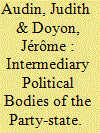

|
|
|
|
|
| Summary/Abstract |
Mass and grassroots organisations are not part of the official political structure of the Chinese Party-state, yet they have been operating as key actors serving the interests of the Party-state while interacting with ordinary citizens in various ways since the early years of the PRC. By studying these organisation’s intermediary status and role in the XXIst century, this special issue of China Perspectives reveals their importance in the political system – as mediators, social service providers, administrative staff – and analyses recent reforms of these organisations under the Xi government.
|
|
|
|
|
|
|
|
|
|
|
|
|
|
|
|
| 7 |
ID:
168022


|
|
|
|
|
| Summary/Abstract |
The essay examines the meanings of waste in the community formation of waste pickers in today’s Chinese megacities. We show that waste pickers in China echo to a certain extent the precarious and stigmatised labour conditions among those in the global south. But we have found that in China, financial reasons alone were not what pushed migrants to enter the trade. In fact, we have found that waste pickers in Beijing enter the waste business also to experiment with urban citizenship, freedom from the factory regime, entrepreneurship, and household making on the fringe of the nation’s capital. Their strategies of working with waste offer a prism for understanding the wider dimension of social and cultural life in the waste community in a major city of China – what we refer to as “living with waste.” “Living with waste” in this paper is intended as a framework to encompass the everyday effort to work with, experience, and live with waste matter on a daily basis. How do waste pickers talk about their job? Is it just about stigmatisation and suffering? Can it be about business and mobility? How do they feel about raising kids in a waste-collecting courtyard? If dirt is “matter of out of place” (Douglas 1966), how do they deal with impurity and contamination on a daily basis? What kind of efforts do they make to normalise or create boundaries in the undesirable working and living environment? Living with waste, then, is deeply bound with efforts not only to make a livelihood, but also to constantly negotiate one’s position with and draw boundaries from waste within the family and the community, in order to make the job bearable, and even meaningful.
|
|
|
|
|
|
|
|
|
|
|
|
|
|
|
|
| 8 |
ID:
168019
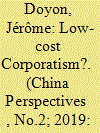

|
|
|
|
|
| Summary/Abstract |
The Communist Youth League has developed a network of sub-organisations to expand its reach at minimum cost. It exemplifies the low-cost corporatism model. Following this model, mass organisations maintain a corporatist relationship with the Party while diversifying their activities through structures they supervise. These structures also provide them with additional material and human resources. In this configuration, the Communist Youth League maintains an equilibrium between dependence on the Party and attractiveness to young people. However, reforms put forward under Xi Jinping challenge this fragile equilibrium by strengthening Party control over the League and its sub-organisations.
|
|
|
|
|
|
|
|
|
|
|
|
|
|
|
|
| 9 |
ID:
168020
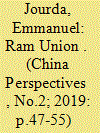

|
|
|
|
|
| Summary/Abstract |
The Ram Union is a non-profit social organisation established in 2003 in Zhejiang Province. Its transformation from a local entity into an international NGO tells us about the methods implemented by the Chinese Communist Party (CCP) to accompany the development of popular associations or minjian, which appear to be external to the Party but which in fact are fully sponsored by it. Studying such organisations is a complex matter, as they appear to act in a benevolent and apolitical manner, while being completely integrated within the political and social apparatus of the Party-state (Youth League, volunteers, United Front, ministry of Civil Affairs, etc.). The historical trajectory of the Ram Union thus gives us insight into the CCP’s overlooked strategy of hybridisation, involving mass organisations that came out of the revolutionary period and charitable groups embodying modern Chinese society. This strategy is designed to occupy the social arena and forestall the emergence of an autonomous Chinese civil society in the People’s Republic of China (PRC) or among the Chinese diaspora overseas.
|
|
|
|
|
|
|
|
|
|
|
|
|
|
|
|
| 10 |
ID:
168018


|
|
|
|
|
| Summary/Abstract |
This article analyses the way in which, since 2010, Chinese trade unions have been trying to find forms of authoritarian collective bargaining that allow them to advance workers’ interests without calling into question their belonging to the state apparatus. It compares the case of the Dalian Industrial Zone to that of the Shenzhen Pilot Zone in a bid to understand how the unions try to acquire effectiveness and legitimacy in the absence of any progress in terms of representation.
|
|
|
|
|
|
|
|
|
|
|
|
|
|
|
|
|
|
|
|
|